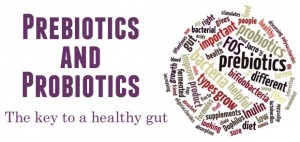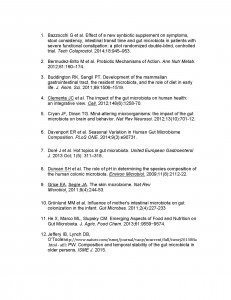by Livia Ly, MS, RD, LDN. Dietitian | Nutritionist • Owner. Nutrily, LLC |
How have you been getting along with your gut bacteria lately? Hopefully pretty well, as you have trillions of them living in your gut and they are responsible for your immunity, metabolism, and brain health! And this list keeps increasing with more research being published.
Most of the studies though, are associational, but there is evidence that your gut bacteria is dictating the direction your health is taking. The composition of your gut bacteria is determined by some factors that cannot be changed, like age, gender, region of origin6,11, birthing method (C-section vs. vaginal delivery)10 and first foods (breast milk vs. formula)10. But other factors also influence your gut bacteria composition and can be changed such as:
- Pollutants in your environment13
- An unhealthy diet22
- Lack of exercise or training overload with no appropriate recovery14,18
- Use of laxatives and antibiotics19,26
- Poor chewing12
- Changes in salivary, stomach and intestinal pH and weakened immunity8
- Frequent consumption of food dyes and preservatives11
- Low intake of water15
Remember, your healthy gut bacteria has to be replenished every day. Your small intestine is large, I mean it’s larger than a tennis court! And it is the gateway of nutrients that will be distributed throughout your body. All the varieties of healthy bacteria participate in digestion, absorption, formation of short-chain fatty acids from fiber, formation of vitamins B3, B5, B6, B12, folate, biotin, and vitamin K, cholesterol reduction, toxin and pathogen elimination, and hormone formation (including brain and satiety hormones). From fermentation, bacteria can produce anti-inflammatory components and the gut immune system is made up of specialized immune cells that produce antibodies3,17,19,20 Gut bacteria also produce conjugated linoleic acid, a potent anti-cancer and anti-obesity component2. Yes, they are busy!
But your gut bacteria can be the unhealthy variety and make you sick. When the gut wall is irritated or inflamed, the tight junctions between your gut cells loosen up and you get increased permeability. Then you may get unpleasant symptoms like:
- Constipation and / or gas1,
- Brain related symptoms. Your brain and gut are connected through the hormonal (cortisol), immune (cytokines) and neural (vagus and enteric nervous system) pathways5:
- depression, insomnia (tryptophan which would be converted into serotonin, the hormone of well-being, and melatonin, will be converted by pathogenic bacteria in other toxic substances)5,7,25,
- memory loss (inflammation favors the death of neurons)5,
- stress (lack of bacteria which are capable of controlling the levels of cortisol)5,
- Increased urge for sweets (stimulated by the lack of serotonin and other nutrients that had their absorption compromised)16
- Weight gain (due to increased inflammation and decreased serotonin levels. In addition, gut bacteria affects the amount of energy taken from your diet and consequently helps increase the storage of fats; it also regulates genes related to obesity)22; or weight loss (due to malabsorption).
- Developed metabolic disorders, such as insulin resistance22
- Increases in cholesterol (due to the toxicity that is generated, favoring an increase in endogenous cholesterol, which is produced by your body)17,
- Poor immunity and increased inflammation and allergenic reactions: such as migraines, rhinitis, sinusitis, arthritis, cellulitis, among others21,
- Urinary tract infections21,
- Fungal infections like candidiasis21 or ringworm23,
- Acne or skin irritation9,
- Gastritis by H. pylori bacteria4,
- Symptoms related to lack of vitamins and minerals (due to malabsorption) like anxiety, hair loss, nail weakness, osteoporosis, and anemia among many others.
I am a dietitian and I talk a lot about poop! What does your poop look like on an average day? Your answer will say a lot about your health. Going to the bathroom every day is not a sign of a proper healthy bowel. Your daily stool should be brown, smooth with no cracks, whole, without food debris, mucus or blood. You should not have difficulty eliminating it. Healthy feces are so important that people have been doing feces transplantations to fight infections, inflammation, or chronic diarrhea here in the U.S.24 Isn’t that insane? Hopefully you are taking this seriously by now, your gut bacteria is the boss of your body. But even if you go to the bathroom every day, you may still have the above symptoms that are related to poor gut bacteria.
If you want to lose fat, gain muscle, improve your sports performance, and boost your health and your mood, you will first need to take care of your gut bacteria. I recommend that you take these 5 steps to address all of your problems by fixing your gut:
STEP 1) Eat plenty of prebiotics and probiotics
Some non-digestible carbohydrate substances reach your gut and are metabolized to promote the growth of healthy gut bacteria, these substances are called prebiotics and are found in foods rich in fiber like inulin found in endive, asparagus, leek, onions, garlic, green banana (check out my recipe to make a green banana biomass here), wheat, artichoke, and herbs and fructo-oligosaccharides, found in onion, garlic, tomato, green banana, oats, barley, wheat, and honey.
The gut bacteria use these prebiotics as foods while promoting fermentation and producing lactic acid, short chain fatty acids and gas, which leads to a reduction of intestinal pH and stimulates growth of healthy gut cells.
A recent study, double-blinded RCT, published and led by Dr. Kelly Swanson at the Journal of Nutrition this month, investigated that the agave plant inulin differs from other inulin type fibers, and the researchers suggested that these differences affect bacterial use and health results. There were 29 healthy adults in the study and they took 0, 5, or 7.5 g/day of agave inulin for three weeks (three-period, crossover trial for 21 days with seven days washouts between periods). Stools were collected and examined and it was found that Bifidobacterium (healthy gut bacteria) levels increased three or fourfold after 5 and 7.5 grams/day, respectively, of agave inulin supplementation. Cool! I asked Dr. Swanson why we should choose agave over other inulin sources, and this is what he said:
“Because animal studies had reported lower body weight, fat mass %, and blood lipids (triglycerides; cholesterol) and glucose concentrations in rodents fed agave inulin compared to those fed other inulin sources, we were interested in its response in humans. In general, I think all forms of inulin have the potential for improved gastrointestinal health. Given the structure and degree of polymerization of agave inulin and our tolerance data, however, it appears that the agave source is fermented at a slower rate than the linear forms and may be tolerated at a higher dose. Translating these data to consumers, it appears that the benefits of agave inulin on gut microbiota and other gastrointestinal health measures may be obtained with fewer side effects (e.g., flatulence and gastrointestinal discomfort).”
You can buy agave inulin powder here and try it out for yourself.
There is also another class of substances, called probiotics that contain live bacteria (such as Lactobacillus and Bifidobacterium) that produce beneficial effects, favoring the gut.
Another double-blinded RCT study published in 2012 at the amazing Journal of the International Society of Sports Nutrition demonstrated that probiotic supplementation improves intestinal barrier function and reduces inflammation in trained male endurance athletes. This means probiotics protect the integrity of your gut wall. If you decide to try a supplement, choose one that contains a variety of strains and at least 1 billion or more active cells, but to avoid imbalance don’t overuse it. If you prefer to stay on the safe side, stick to fermented foods like fermented milk (e.g. Yakult), yogurt (e.g. Kalona SuperNatural™), kefir and kombucha (e.g. Cultures for Health), sauerkraut, kimchi, and sourdough bread, miso, tempeh are all good sources of various strains of bacteria.
Other types of fiber also help your gut work better. Insoluble fiber found in whole grains, wheat germ, seeds, nuts, beans, fruits (dried plums, raspberries, apples, strawberries, grapes, and raisins), and vegetables (zucchini, celery, broccoli, cabbage, onions, tomatoes, carrots, cucumbers, dark leafy vegetables, and root vegetable skins) improve regularity reducing our exposure to potentially dangerous compounds. The breakdown of fiber also regulates pH balance promoting the optimal environment for beneficial bacteria.
STEP 2) Other foods I think you need to consider
Turmeric is a powerful anti-inflammatory food that you must include in your cooking (add black pepper to absorb turmeric better).
Add omega 3 fatty acids (salmon, tuna, sardines, flaxseeds, walnuts, and algae) and other healthy fats (olives, avocado, coconut, nuts, seeds, and cacao) to help decrease inflammation.
Other anti-inflammatory foods are tart cherries, apple peels and almonds.
Consider flavonoids to improve gut health with their powerful antioxidant content.
| Flavonols | flavan-3-ols* | flavones | flavonones | anthocyanidins |
| Onions | apples | parsley | oranges | blueberries |
| Apples | bananas | bell peppers | grapefruit | bananas |
| romaine lettuce | blueberries | celery | lemons | strawberries |
| Tomatoes | peaches | apples | tomatoes | cherries |
| garbanzo beans | pears | oranges | pears | |
| Almonds | strawberries | watermelon | cabbage | |
| turnip greens | chili peppers | cranberries | ||
| sweet potatoes | cantaloupe | plums | ||
| Quinoa | lettuce | raspberries | ||
| garbanzo beans |
Source: WHFoods
STEP 3) Supplement wisely
Check to see if you are not vitamin D or iron deficient, as their insufficient levels are related to poor gut function and consequent malabsorption of other nutrients. If you are an endurance athlete, you should be especially concerned about your iron level.
Consider glutamine because it improves gut functioning and help reverse excessive gut permeability.
You may also need to take digestive enzymes. Check this with your doctor
STEP 4) Foods that you may need to eliminate
Maybe it’s not the food that you are not eating enough of that is causing your symptoms, but the foods that you are eating. Common offenders are:
- Lectins: a type of protein found in grains, beans, and nuts,
- Gluten from wheat, hordein in barley, secalin in rye, or zein in corn,
- Casein, lactose, and other immunoglobulins in dairy,
- Fructose,
- Sugar alcohols,
- Added sugars in foods,
- Refined grains (as they stimulate the growth of fungi, yeasts and harmful bacteria in the intestine),
- MSG,
- Alcohol,
- Processed foods high in saturated fats,
- Industrialized juices and sodas.
You may try an elimination diet or a diet called FODMAP with your dietitian (hopefully me!). You may also try to reduce your chemical consumption if you buy organic foods when possible, avoid heating foods in plastics, and avoid fish high in mercury (tilefish, king mackerel, swordfish, albacore tuna, and shark).
STEP 5) Change your lifestyle
Get to the root cause. While there can be many causes of gut problems, there is always a cause and promoting an overall healthy lifestyle can help.
- Quit smoking,
- Manage your stress and anxiety level,
- Go to the bathroom at the same time every day,
- Exercise,
- Drink more water to promote healthy poop,
- Eat slowly. The process of slow chewing is important for enzyme release to break down food into particles that are manageable for the gut to absorb,
- Stop eating when satisfied to avoid overconsumption of sugars, processed grains, processed meats, and dairy,
- Sleep well,
- Recover well after strenuous exercise. High training loads creates a chronic stress from which the body struggles to recover and produces inflammation,
- Avoid liquids with your meals as it affects your stomach by diluting the gastric juices, causing the food to reach the intestine undigested. This undigested food may cause allergies and malabsorption,
- Eat spices like rosemary, ginger, garlic, and cinnamon to avoid the overgrowth of fungi that increases infections.
There you have it, five steps to promote a powerful healthy gut bacteria that will keep you healthy and feeling great!
References





